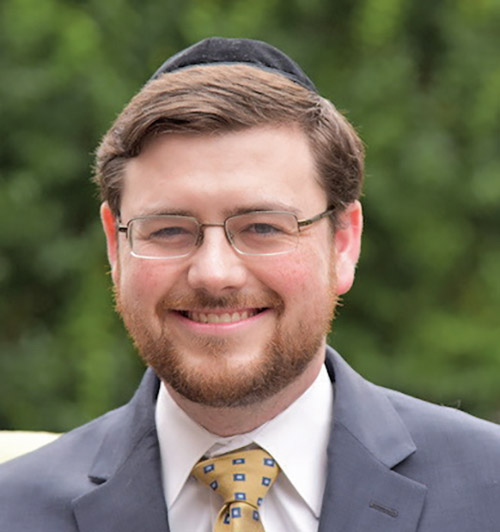
Receiving the Torah at Sinai was one of the most formative experiences for the Jewish people. The rabbis teach that many of the laws of studying and teaching Torah are modeled on that experience. One midrash expresses this idea quite forcefully:
Says Rabbi Shimon ben Lakish (known as Reish Lakish): anyone who expounds upon words of Torah that are not pleasant to the listeners, like a bride is pleasant to her groom, it is preferable that it should have not been said. Why? For at the time that the Holy One, Blessed is He, gave the Torah to Israel it [the Torah] was precious to them like a bride is precious to her soulmate, like it says, “And He gave to Moses as He finished [ke’chaloto]” (a play on words with the word kallah, bride).
Reish Lakish demands that the Torah we present be attractive. A tall order for educators of all times, all the more so today. I recall the time when I was a rebbe in Camp Dora Golding and a storm canceled the planned outdoor activities. Instead, the campers shuffled into the lunchroom to sit and watch “Harry Potter and the Chamber of Secrets.” During the movie, one of the other rebbeim turned to me and quipped, “No wonder I can’t attract their attention; I don’t breathe fire. I’m no competition to Harry Potter.”
Challenge notwithstanding, if we don’t present attractive Torah, Reish Lakish tells us that it would have been better had we not shared any Torah at all. The danger of leaving a bad impression outweighs the benefit of sharing the actual content. Yes, Torah is compared to wine, and in many ways is also an acquired taste. We should not expect our students and children to automatically be enthralled with their Jewish education. Still, Reish Lakish’s statement is unequivocal; we must search for a way to make Torah “attractive like a bride.”
Continuing the parable, just as it is obvious that every groom is attracted to his specific bride, it is our imperative to find the unique Torah befitting each individual. Rav Kook, in his Orot HaTorah (9:6), reminds us of the dangers of forcing students to learn things they are not interested in. He notes that there are individuals who have left Judaism because the education they received “betrayed their unique personality.”
A colleague shared with me educational theorist Neil Postman’s unfortunate observation that “school is a place where students go to get answers to questions they don’t have.” As well, my rebbe, Rabbi Mendel Blachman of Yeshivat Kerem B’Yavneh, is fond of recounting an experience he had during his first year teaching. Rabbi Blachman was teaching Masechet Yevamot and mentioned the famous question that Rabbi Akiva Eiger raises at the beginning of the tractate. One young student called out, “Nu, if Rabbi Akiva Eiger has a question, let him deal with it. Why should I care?” Rabbi Blachman took the message to heart. Torah is only meaningful if it answers your question.
At times, it can seem hard to find anything educational that young people find attractive. It can feel like we are in a losing battle against a fire-breathing dragon or Fortnite. One of my mentors, Rabbi Yair Eisenstock, has reminded me that everyone really does desire deep meaningful ideas; we just need to find a way to reach them. As my first year as a teacher, I have had the pleasure of watching my ninth-grade students grow over the past 10 months. I have seen with my own eyes that young people, given the proper environment, are able and excited to articulate deep and meaningful thoughts about Torah. The thirst for Torah is there. It is our job to cultivate it.
There is another important application of Reish Lakish’s dictum. Rabbi Reuven Leuchter, a popular educator in Israel, addresses a very important question in his book “Teshuvah, Restoring Life.” The great minds of the mussar movement were well aware that religious growth occurs gradually. As such, they recommended that individuals should make small incremental changes in the process of repentance. Specifically, Rabbi Yisrael Salanter recommended that a person set goals that are easy to reach. The question Rabbi Leuchter raises is how does one make sure that such change is in fact meaningful? Rabbi Leuchter quotes Rabbi Chaim Volozhiner, who says that the key to teshuvah, repentance, is to appreciate the pleasantness of Torah. The Talmud (Shabbat 105a) says that the first word in the Ten Commandments, Anochi, I, is an acronym for Amira Neima Ketiva Yehiva, a pleasant word I (i.e., God) have written and given. Explains Rabbi Leuchter, incremental change will be successful when coupled with deep learning. The change in deed may be in fact minimal. Once one begins to study relevant Torah and appreciate the beauty and depth of God’s commandments does each step then become all the more meaningful.
It should be God’s will that we truly experience the Amira Neima of Torah and succeed in sharing that experience with those around us.
By Zachary Rothblatt
Rabbi Zachary Rothblatt is a Judaic studies teacher at The Idea School. Rabbi Rothblatt is currently in his fourth year of semicha at RIETS. A Teaneck-native and Frisch alumnus, Rabbi Rothblatt pursued advanced Jewish studies at Yeshivat Kerem B’Yavneh and Ner Israel Rabbinical College. He holds a bachelor’s in business and a master’s in education from Johns Hopkins University. Rabbi Rothblatt is also currently pursuing an additional master’s in Bible and Talmud at the Bernard Revel Graduate School of Jewish Studies.










